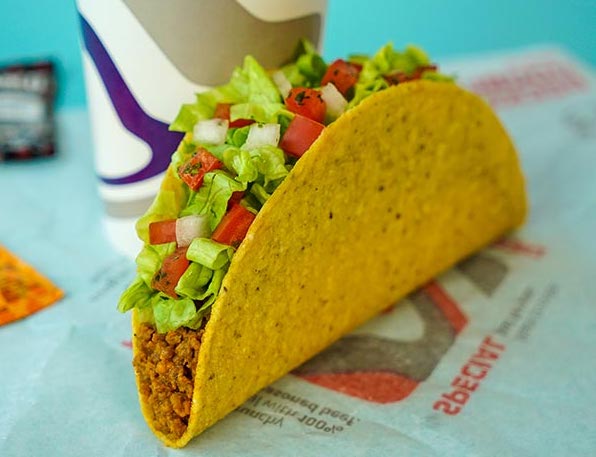Taco Bell releases new antibiotics policy for beef
As Taco Bell places new requirements on beef suppliers, today’s BEEF Daily addresses what the industry has already done to help solve the issue of antimicrobial resistance in people.
July 29, 2019

If you’ve read this blog post for a while, then you know my time spent with BEEF has been largely focused on consumer trends and answering the all-important question: What do consumers want and how can beef producers deliver?
I have committed a great deal of time, energy and thought to testing different theories and addressing various issues with a wide range of talking points. Through trial and error, I’ve discovered some messages resonate and others don’t even come close to hitting the mark.
Results of advocacy and outreach efforts are contingent on the particular audience. That’s because just like no two cattlemen operate the same, our consumers also have differing values, beliefs and priorities when it comes to deciding what to purchase at the grocery store.
So in a nutshell, there’s really no one-size-fits-all approach to connecting with consumers.
Let me give you an example. Vaccinations in relation to both human and animal health continue to be a hot topic of conversation in society.
We have the no-vaccine camp, who don’t believe in building herd immunity (in people) or preventing illness and disease from occurring in the first place. In the same breath, we have consumers who, every time their child gets the sniffles, are first in line at the doctor to get a prescription, but then blame cattle for antimicrobial resistance when the round of antibiotics fails to work for their child.
There is a great deal of confusion out there regarding vaccinations, antibiotics and health prevention and treatment in both people and animals. Consequently, animal agriculture has become a large focus area in society, with consumers, medical professional, veterinarians, retailers, processors and producers all weighing in to discuss the best routes for addressing this issue in human health.
And while there may be no easy answers, I do believe it’s important that animal agriculture strongly voice that we are doing several key things to combat antimicrobial resistance.
The American Veterinary Medical Association (AVMA) outlines some of the core principles and antimicrobial stewardship practices followed by livestock producers and veterinarians alike.
According to the AVMA, “Antimicrobial stewardship involves maintaining animal health and welfare by implementing a variety of preventive and management strategies to prevent common diseases; using an evidence-based approach in making decisions to use antimicrobial drugs; and then using antimicrobials judiciously, sparingly, and with continual evaluation of the outcomes of therapy, respecting the client’s available resources.”
These core principles include a commitment to stewardship, advocating for a system of care that prevents common diseases, selecting and using antimicrobial drugs judiciously, evaluating antimicrobial drug use practices and educating and building expertise in this area.
Read more about these core values here.
Whether it’s the Veterinary Feed Directive or simple things like withdrawal times, the animal agricultural industry is already making great strides to be responsible, judicious users of preventative and treatment protocols. Additionally, a greater focus has been placed on promoting optimal gut health and practicing best standards of care to create an environment for wellness and avoid sickness in animals altogether.
I write about this topic today with great frustration as yet another retailer has succumbed to misguided consumer perceptions about animal agriculture and antibiotic use.
In a recent press release, Taco Bell announced a new policy for how the company will source beef for its popular tacos and burritos in the future.
According to the release, “As of today (July 29), Taco Bell has committed to reduce antibiotics important to human health in its beef supply chain by 25% by 2025. Effective across the U.S. and Canada, this change covers 98% of the company’s global beef supply.
“For this new policy, Taco Bell worked with long-term supplier partners for over a year and a half to ensure it benefitted all parties involved. The company will continue to work towards identifying effective approaches to limiting antibiotic use, based on scientific evidence and in accordance with proper animal welfare practices.
“Taco Bell will share progress against this goal in 2022, while continuing to prioritize involvement in collaborative industry efforts along the way, including participation in the U.S. Roundtable for Sustainable Beef and the Center for Disease Control’s Antimicrobial Resistance Challenge.
“Since 2014, Taco Bell has been spearheading industry efforts regarding consumers’ food supply concerns, including animal welfare and antibiotic resistance. In early 2017, the brand eliminated antibiotics important to human health in its U.S. chicken supply.
“Taco Bell’s beef supply includes premium beef, such as USDA Prime, Choice and Select grade beef, seasoned without any artificial colors or flavors. This policy is another way the brand is making food with simpler, higher quality ingredients served with full transparency.”
Taco Bell’s policy details read:
Antibiotics important to human health are those defined as “critically important,” “highly important,” and “important” according to the World Health Organization’s Critically Important Antimicrobials for Human Medicine, 4th Revision, 2013.
Taco Bell will give preference to suppliers that:
Make measured reductions in their use of antibiotics important to human health, as defined by the World Health Organization.
Increase veterinary oversight when required to medically treat sick animals, from diagnosis to treatment to compliance. This will occur through Veterinary Client Patient Relationships (VCPR).
Participate in animal husbandry practices that promote antibiotic stewardship.
Taco Bell will continue to prioritize involvement in collaborative industry efforts:
Taco Bell participates in the U.S. Roundtable for Sustainable Beef (USRSB), a network of beef experts working towards a purpose-oriented beef supply.
Through YUM! Brands, Taco Bell has joined the Center for Disease Control’s Antimicrobial Resistance Challenge, a yearlong effort to accelerate the fight against antimicrobial resistance across the globe.
Taco Bell’s antimicrobial policy seeks to reinforce and build upon YUM!’s Good Antimicrobial Stewardship policy, which focuses on responsible, judicious use of antimicrobials to benefit human, animal and environmental health.
A few outgoing thoughts — I do believe these retailers are responding to consumers’ concerns regarding antibiotic use in animal agriculture. Their hearts are in the right place, but I think sometimes these increased requirements and restrictions on how livestock producers can manage herd health are misguided and based on sketchy science.
Ultimately, I think animal agriculture can and should and has already played a role in addressing this hot topic. However, I also feel that limiting how producers are able to prevent and treat disease and illness in their livestock only leads to greater animal suffering, which if pressed, I don’t think the consumer wants.
So what is the answer to the ultimate question — what do consumers want and how can beef producers deliver?
It’s obvious consumers want a product that is safe, wholesome and nutritious, one that aligns with their values and beliefs, and something that benefits society as a whole. It’s a tall order for producers, and we are certainly going to have to expand our research in animal nutrition and herd health if we are going to be able to comply to increasing demands from retailers.
Are we up to the challenge? Yes, I think so. But I also think we need to do more educating, outreach and connecting with our consumers and retailers, so they understand the strides we have already made in regard to the issue of antimicrobial resistance.
The opinions of Amanda Radke are not necessarily those of beefmagazine.com or Farm Progress.
About the Author(s)
You May Also Like


.png?width=300&auto=webp&quality=80&disable=upscale)


